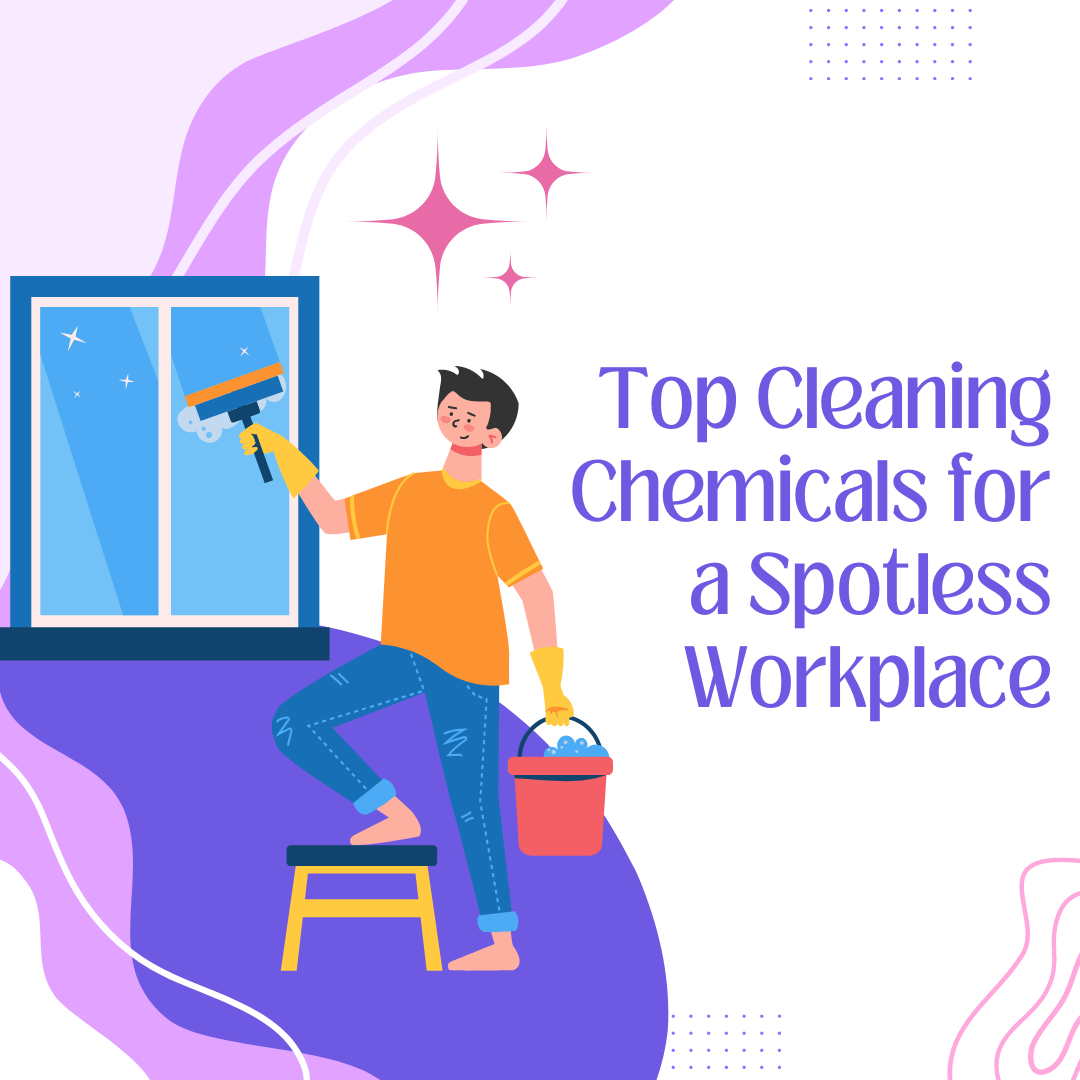
Top Cleaning Chemicals for a Spotless Workplace
Melika GHASEMIFARDA clean workplace is essential for health, productivity, and creating a positive impression. But choosing the right cleaning chemicals can be confusing with so many options available. In this guide, we'll simplify it for you. Let's dive into the top cleaning chemicals that will keep your workplace spotless and safe.
Why Cleanliness Matters
Keeping your workplace clean isn't just about appearances. A clean environment reduces the spread of germs, preventing illness and keeping your team healthy. It also boosts morale and productivity. Imagine working in a cluttered, dirty space versus a clean, organized one. The difference is night and day.
Key Cleaning Chemicals for Your Workplace
1. Disinfectants
Disinfectants are your frontline defense against germs and bacteria. Use them on high-touch surfaces like doorknobs, keyboards, and shared equipment.
- Quaternary Ammonium Compounds (Quats): Effective against a wide range of pathogens. Look for products with at least 70% alcohol for the best results.
- Bleach: A powerful disinfectant that kills most bacteria, viruses, and fungi. Ensure proper ventilation when using bleach, as the fumes can be strong.
2. All-Purpose Cleaners
These are versatile and can be used on various surfaces, making your cleaning routine more straightforward.
- Multi-Surface Cleaners: Ideal for countertops, desks, and walls. They remove dirt and grime effectively.
- Green Cleaners: Eco-friendly options that are safe for the environment and your health.
3. Glass Cleaners
For sparkling windows and mirrors, glass cleaners are essential.
- Ammonia-Based Cleaners: These provide streak-free results, perfect for glass surfaces.
-
Vinegar Solutions: A natural alternative that cleans glass
kills bacteria, viruses, and fungi. Dilute it properly (usually one part bleach to nine parts water) to avoid damaging surfaces and ensure safety.
2. All-Purpose Cleaners
All-purpose cleaners are versatile and can be used on a variety of surfaces, making them a staple in any cleaning arsenal.
- Surfactant-Based Cleaners: These break down grease and grime effectively. Look for biodegradable options to be eco-friendly.
- Enzyme Cleaners: These use natural enzymes to break down organic matter, ideal for kitchens and bathrooms.
3. Glass Cleaners
Keep windows, mirrors, and glass surfaces sparkling clean without streaks.
- Ammonia-Based Cleaners: Highly effective at removing smudges and streaks. Use in well-ventilated areas.
- Vinegar Solutions: A natural alternative that’s safe and effective, especially when mixed with water and a few drops of dish soap.
4. Degreasers
For industrial or kitchen settings where grease buildup is common, degreasers are essential.
- Solvent-Based Degreasers: Powerful and fast-acting, but ensure proper ventilation and protective gear when using them.
- Water-Based Degreasers: Safer for the environment and less harsh on surfaces, though they might require a bit more elbow grease.
5. Floor Cleaners
Different types of flooring require different cleaning solutions.
- pH-Neutral Cleaners: Safe for all floor types, including wood and laminate. They clean effectively without damaging the finish.
- Alkaline Cleaners: Best for tough stains and heavy soil on tile or concrete floors. Use sparingly and rinse thoroughly.
6. Bathroom Cleaners
Bathrooms are a hotspot for germs, so specialized cleaners are a must.
- Acid-Based Cleaners: These tackle mineral deposits and soap scum effectively. Use with caution and proper protective gear.
- Bleach-Based Cleaners: Ideal for disinfecting and whitening surfaces but can be harsh. Use in well-ventilated areas.
7. Specialty Cleaners
Sometimes, specific tasks require specialized cleaners.
- Stainless Steel Cleaners: Keep metal surfaces shiny and free of fingerprints.
- Wood Cleaners and Polishers: Maintain the beauty and longevity of wood furniture and floors.
How to Use Cleaning Chemicals Safely
Using cleaning chemicals safely is crucial to protect yourself and your workplace environment. Here are some tips:
- Read Labels: Always follow the manufacturer’s instructions for proper use and dilution.
- Ventilate: Ensure good ventilation to avoid inhaling fumes, especially when using strong chemicals.
- Protective Gear: Wear gloves, masks, and eye protection as needed.
- Storage: Store chemicals in a cool, dry place away from direct sunlight and out of reach of children.
Conclusion
Choosing the right cleaning chemicals is key to maintaining a spotless and healthy workplace. From powerful disinfectants to eco-friendly all-purpose cleaners, the right products make all the difference. Remember to use them safely, follow the guidelines, and keep your workplace shining. Here’s to a clean, productive, and welcoming environment for everyone!
FAQs
What is the most effective disinfectant for a workplace?
Quaternary ammonium compounds (quats) and bleach are among the most effective disinfectants. Ensure proper dilution and usage for maximum effectiveness.
Can I use household cleaners in a workplace?
While some household cleaners can be used, it’s best to choose commercial-grade products designed for higher traffic and tougher cleaning jobs.
How often should I clean high-touch surfaces?
High-touch surfaces should be cleaned and disinfected daily to minimize the spread of germs.
Are eco-friendly cleaners effective?
Yes, many eco-friendly cleaners are highly effective. Look for products with natural enzymes and biodegradable ingredients.